Related Research Articles
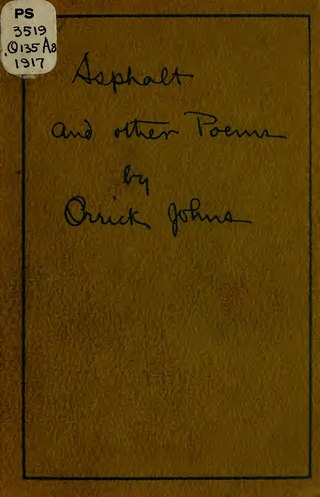
Orrick Glenday Johns was an American poet and playwright. He was one of the earliest modernist free-verse poets in Greenwich Village in 1913-1915 and associated with the artist's colony at Grantwood, New Jersey, where Others: A Magazine of the New Verse was founded and published by Alfred Kreymborg in 1915. Johns's work "Olives," a series of fourteen small poems appeared in the first issue of July 1915. He is part of a coterie of poets and authors sometimes called the "Others" group who were contributors to the magazine or residents at the colony and included: William Carlos Williams, Wallace Stevens, Marianne Moore, Mina Loy, Ezra Pound, Conrad Aiken, Carl Sandburg, T. S. Eliot, Amy Lowell, H.D., Djuna Barnes, Man Ray, Skipwith Cannell, Lola Ridge, Marcel Duchamp, and Fenton Johnson (poet). Johns is also associated with poets like Vachel Lindsay and Sara Teasdale. and the dramatist Zoe Akins.

The term Metaphysical poets was coined by the critic Samuel Johnson to describe a loose group of 17th-century English poets whose work was characterised by the inventive use of conceits, and by a greater emphasis on the spoken rather than lyrical quality of their verse. These poets were not formally affiliated and few were highly regarded until 20th century attention established their importance.

Delmore Schwartz was an American poet and short story writer.

Jerome Rothenberg was an American poet, translator and anthologist, noted for his work in the fields of ethnopoetics and performance poetry. Rothenberg co-founded the method of ethnopoetics with Dennis Tedlock in the late 1960s.

Harold Hart Crane was an American poet. Inspired by the Romantics and his fellow Modernists, Crane wrote highly stylized poetry, often noted for its complexity. His collection White Buildings (1926), featuring "Chaplinesque", "At Melville's Tomb", "Repose of Rivers" and "Voyages", helped to cement his place in the avant-garde literary scene of the time. The long poem The Bridge (1930) is an epic inspired by the Brooklyn Bridge.
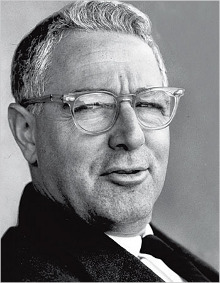
Karl Jay Shapiro was an American poet. He was awarded the Pulitzer Prize for Poetry in 1945 for his collection V-Letter and Other Poems. He was appointed the fifth Poet Laureate Consultant in Poetry to the Library of Congress in 1946.

Malcolm Cowley was an American writer, editor, historian, poet, and literary critic. His best known works include his first book of poetry, Blue Juniata (1929), and his memoir, Exile's Return, written as a chronicler and fellow traveller of the Lost Generation and an influential editor and talent scout at Viking Press.

The Kenyon Review is a literary magazine based in Gambier, Ohio, US, home of Kenyon College. The Review was founded in 1939 by John Crowe Ransom, critic and professor of English at Kenyon College, who served as its editor until 1959. The Review has published early works by generations of important writers, including Robert Penn Warren, Ford Madox Ford, Robert Lowell, Delmore Schwartz, Flannery O'Connor, Boris Pasternak, Bertolt Brecht, Peter Taylor, Dylan Thomas, Anthony Hecht, Maya Angelou, Rita Dove, Derek Walcott, Thomas Pynchon, Don Delillo, Woody Allen, Louise Erdrich, William Empson, Linda Gregg, Mark Van Doren, Kenneth Burke, and Ha Jin.

Steven Donald Dalachinsky was an American downtown New York City poet, active in the music, art, and free jazz scenes. He wrote poetry for most of his life and read frequently at Michael Dorf's club the Knitting Factory, the Poetry Project and the Vision Festival, an Avant-jazz festival held annually on the Lower East Side of New York City. Dalachinsky also read his works in Japan, France and Germany. He collaborated with many musicians, writing liner notes for artists: William Parker, Susie Ibarra, Matthew Shipp, Joe McPhee, Nicola Hein, Dave Liebman, Roy Campbell, Daniel Carter, Joëlle Léandre, Kommissar Hjuler, Thurston Moore, Sabir Mateen, Jim O'Rourke, and Mat Maneri
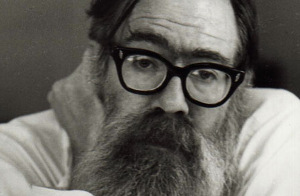
John Allyn McAlpin Berryman was an American poet and scholar. He was a major figure in American poetry in the second half of the 20th century and is considered a key figure in the "confessional" school of poetry. His 77 Dream Songs (1964) won the 1965 Pulitzer Prize for Poetry.

Donald Albert Wandrei was an American science fiction, fantasy and weird fiction writer, poet and editor. He was the older brother of science fiction writer and artist Howard Wandrei. He had fourteen stories in Weird Tales, another sixteen in Astounding Stories, plus a few in other magazines including Esquire. Wandrei was the co-founder of the prestigious fantasy/horror publishing house Arkham House.
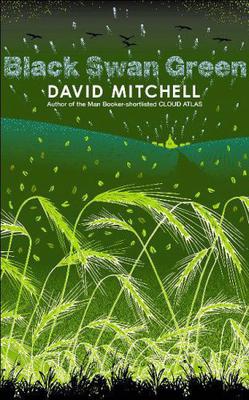
Black Swan Green is a semi-autobiographical novel written by David Mitchell, published in April 2006 in the U.S. and May 2006 in the UK. The bildungsroman's thirteen chapters each represent one month—from January 1982 through January 1983—in the life of 13-year-old Worcestershire boy Jason Taylor. The novel is written from the perspective of Taylor and employs many teen colloquialisms and popular-culture references from early-1980s England.
James Robert Atlas was a writer, especially of biographies, as well as a publisher. He was the president of Atlas & Company and founding editor of the Penguin Lives Series.
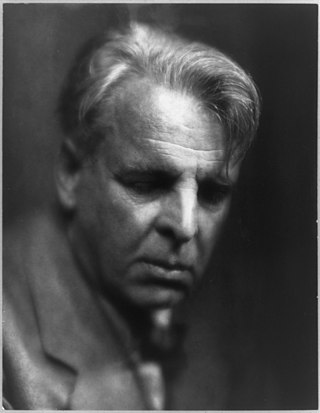
"Politics" is a poem by Irish poet William Butler Yeats written on May 24, 1938. It was composed during the time of the Spanish Civil War as well as during the pre-war period of Adolf Hitler's Third Reich in Germany. The poem hints at the political situations of "Rome" (Italy), "Russia", and Spain, but ultimately discusses topics more relevant to private human interaction rather than public, or political situations. The poem never mentions Germany or Hitler, despite the fact that the "war and war's alarms" surrounding the poem's creation arose from fears of Germany's aggression rather than Italy's, Russia's, or Spain's. Many versions of the text exist: the original typescript of May 1938, the first typescript with hand-written corrections dated August 12, 1938, as well as a final "Coole Edition" of the poem dated June 29, 1939, which was not published until it was included in Last Poems in 1939. Yeats intended for the poem to be printed last in the collection, as an envoi to "The Circus Animals' Desertion", and while a debate as to the true order of the poems has continued since 1939, "Politics" was the last lyric poem Yeats wrote and remains the final work printed in all posthumous editions.
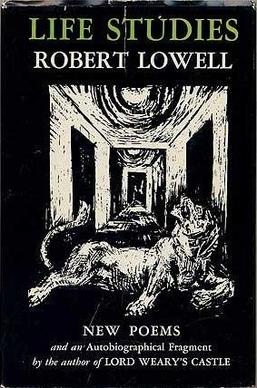
Life Studies is the fourth book of poems by Robert Lowell. Most critics consider it one of Lowell's most important books, and the Academy of American Poets named it one of their Groundbreaking Books. Helen Vendler called Life Studies Lowell's "most original book." It won the National Book Award for Poetry in 1960.
Raphael Rudnik was an American poet and literary scout. His poems have appeared in The New Yorker, The Quarterly Review of Literature, New Directions, and other journals. Rudnik received much acclaim throughout his career, receiving a Guggenheim Fellowship for poetry, the first Delmore Schwartz Memorial Award, and the Mildred L. Batchelder Award for translation. John Cheever called Rudnik "one of the most brilliant poets of his generation."
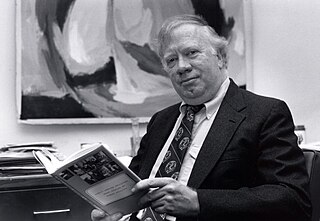
Robert Schaeffer Phillips was an American poet and professor of English at the University of Houston. He was the author or editor of more than 30 volumes of poetry, fiction, poetry criticism and other works.
Little Gidding is the fourth and final poem of T. S. Eliot's Four Quartets, a series of poems that discuss time, perspective, humanity, and salvation. It was first published in September 1942 after being delayed for over a year because of the air-raids on Great Britain during World War II and Eliot's declining health. The title refers to a small Anglican community in Little Gidding in Huntingdonshire, established by Nicholas Ferrar in the 17th century and scattered during the English Civil War.

The Dream Songs is a compilation of two books of poetry, 77 Dream Songs (1964) and His Toy, His Dream, His Rest (1968), by the American poet John Berryman. According to Berryman's "Note" to The Dream Songs, "This volume combines 77 Dream Songs and His Toy, His Dream, His Rest, comprising Books I through VII of a poem whose working title, since 1955, has been The Dream Songs." In total, the work consists of 385 individual poems.
Eileen Simpson was an American writer and psychotherapist. Her 1982 book Poets in their Youth records her life with first husband John Berryman and his circle of poets, including Delmore Schwartz and Robert Lowell. In 1984 she was a recipient of a Guggenheim Fellowship for Creative Arts in General Nonfiction.
References
- ↑ "Lou Reed Reads Delmore Schwartz's Famous Story "In Dreams Begin Responsibilities"". Open Culture. December 13, 2014.
- 1 2 Schwartz, Delmore (1978). "Introduction". In Atlas, James (ed.). In Dreams Begin Responsibilities and other Stories. New York: New Directions. ISBN 978-0811206808.
- ↑ Cowley, Jason (May 4, 2003). "Coney matrimony is phoney baloney". The Observer.